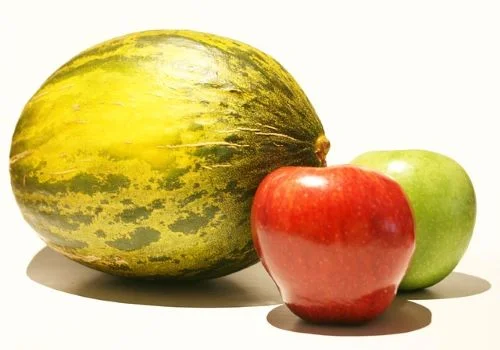Benefits Of Cantaloupe!
Cantaloupe is packed with essential vitamins and minerals, including vitamin A, vitamin C, and potassium, which contribute to a strong immune system, healthy skin, and proper bodily functions.
Introduction:
Ah, the glorious cantaloupe—a true marvel of nature’s juiciest creations. Whether you’ve savored its delectable sweetness or admired its vibrant orange hue, this succulent fruit has undoubtedly earned a place in our hearts and stomachs. But did you know that cantaloupe offers far more than just a refreshing taste? Prepare to be amazed as we embark on a delightful journey through the myriad benefits that this whimsical fruit brings to the table—literally!

In this article, we’ll peel back the layers of cantaloupe’s nutritional wonders and explore the wide range of health benefits it has to offer. From boosting your immune system to keeping you hydrated, this humble fruit is a true champion in the world of wellness. So, sit back, relax, and prepare to be charmed by the delightful cantaloupe!
Now, you might be wondering, “What makes cantaloupe so special?” Well, let me enlighten you. Cantaloupe is bursting with a cornucopia of essential nutrients, making it a treasure trove of health-enhancing elements. Packed with vitamins, minerals, and antioxidants, this fruit is like a superhero on your plate, ready to combat those pesky free radicals and fortify your body’s defenses. And did I mention it’s low in calories too? So, if you’re on a mission to maintain a healthy waistline without compromising on flavor, cantaloupe is here to save the day!
But wait, there’s more! Cantaloupe isn’t just a powerhouse of nutrition; it’s also a hydration hero. With its high water content, biting into a juicy slice of cantaloupe is like quenching your thirst and indulging your taste buds simultaneously. It’s like a pool party for your mouth! So, whether you’re lounging by the beach or conquering the concrete jungle, this fruit will keep you hydrated and refreshed, even on the hottest of days.
So, prepare to be dazzled by the incredible benefits of cantaloupe as we dive deeper into its nutritional prowess, explore its health-enhancing properties, and even uncover its versatile culinary charm. Your journey to a healthier, juicier life begins here with the marvelous cantaloupe—truly nature’s edible enchantment!
- Benefits Of Cantaloupe!
- Introduction:
- 1. Benefits Of Cantaloupe For Skin:
- 2. Benefits Of Cantaloupe For Hair:
- 3. Benefits Of Cantaloupe For Face:
- 4. Benefits Of Cantaloupe For GYM:
- 5. Benefits Of Cantaloupe For Teeth:
- 6. Benefits Of Cantaloupe For Brain:
- 7. Benefits Of Cantaloupe For Male.
- 8. Benefits Of Cantaloupe For Female.
- 9. Benefits Of Cantaloupe For Kids.
- 10. Benefits Of Cantaloupe For Eyes.
- 11. Benefits Of Cantaloupe For Weight Gain.
- 12. Benefits Of Cantaloupe For Weight Loss.
- 13. Benefits Of Cantaloupe For Breakfast.
- 14. Benefits Of Cantaloupe In Morning.
- 15. Extra Benefits Of Cantaloupe:
- Conclusion:
- #What is Cantaloupe?
- #Difference Between Cantaloupe And Muskmelon.
- All Frequently Asked Questions:
1. Benefits Of Cantaloupe For Skin:

Cantaloupe isn’t just a delicious and refreshing fruit; it also offers a range of benefits for your skin. Incorporating cantaloupe into your skincare routine or consuming it regularly can help promote healthy and radiant skin. Let’s explore some of the key benefits of cantaloupe for your skin:
- Hydration and Moisture: Cantaloupe is composed mainly of water, making it an excellent hydrating fruit for your skin. Staying well-hydrated is crucial for maintaining supple and plump skin. Consuming cantaloupe helps to keep your body hydrated from the inside out, contributing to healthy and moisturized skin.
- Antioxidant Powerhouse: Cantaloupe is rich in antioxidants, including vitamins A and C. These antioxidants help combat free radicals, which are harmful molecules that can damage skin cells and contribute to premature aging. Regular consumption of cantaloupe can help protect your skin from environmental stressors, promoting a youthful and vibrant complexion.
- Collagen Production: Vitamin C, present in cantaloupe, plays a vital role in collagen synthesis. Collagen is a protein that provides structure and elasticity to your skin. By consuming cantaloupe, you can support the production of collagen, which helps improve skin elasticity, reduce the appearance of fine lines and wrinkles, and promote a more youthful complexion.
- Skin Brightening: The high vitamin C content in cantaloupe also aids in brightening your skin. Vitamin C helps inhibit the production of melanin, the pigment responsible for dark spots and uneven skin tone. Regular consumption or topical application of cantaloupe can help even out your skin tone, leaving you with a more radiant and glowing complexion.
- Soothing and Calming Properties: Cantaloupe contains anti-inflammatory properties, which can help soothe and calm irritated or inflamed skin. Applying a mashed cantaloupe or cantaloupe juice topically can provide relief to sunburned skin or help reduce redness and inflammation caused by skin conditions like acne or eczema.
To reap the skin benefits of cantaloupe, you can enjoy it as a snack, blend it into smoothies, or incorporate it into your skincare routine. You can use mashed cantaloupe as a face mask or apply its juice directly to your skin for a refreshing and nourishing treatment. Remember to patch test before applying it to your face to ensure there are no adverse reactions.
Using cantaloupe into your diet and skincare regimen can contribute to healthier, more vibrant skin. So, indulge in the juicy goodness of cantaloupe and let your skin glow with its natural benefits.
FAQs:
2. Benefits Of Cantaloupe For Hair:

Cantaloupe, with its rich nutritional profile, offers several benefits for hair health. Incorporating cantaloupe into your diet or using it in hair care routines can help nourish and improve the condition of your hair. Let’s explore some of the key benefits of cantaloupe for your hair:
- Hair Growth and Strength: Cantaloupe is a good source of vitamins A and C, both of which are crucial for healthy hair growth. Vitamin A helps in the production of sebum, which moisturizes the scalp and promotes hair growth. Vitamin C aids in the absorption of iron, a mineral essential for strong and healthy hair. Including cantaloupe in your diet can help nourish your hair follicles, promoting stronger and faster hair growth.
- Hydration and Moisture: Just as cantaloupe helps hydrate and moisturize the skin, it also provides hydration to your hair. Hair that lacks moisture can become dry, brittle, and prone to breakage. The high water content in cantaloupe helps keep your hair hydrated and prevents it from becoming dry and frizzy. Additionally, well-hydrated hair is more manageable and less prone to tangles.
- Scalp Health: A healthy scalp is essential for healthy hair growth. Cantaloupe’s vitamin A content aids in maintaining a balanced scalp by regulating sebum production. This can help prevent a dry or excessively oily scalp, reducing issues like dandruff and itchiness. A healthy scalp creates a conducive environment for hair growth and overall hair health.
- Antioxidant Protection: Cantaloupe contains antioxidants that help protect hair follicles from oxidative stress caused by free radicals. These free radicals can damage hair cells and contribute to hair loss and premature aging. The antioxidants in cantaloupe, such as vitamins A and C, help neutralize free radicals and protect your hair from damage, keeping it healthy and vibrant.
- Nutrient Boost: Cantaloupe is a nutrient-rich fruit, providing essential vitamins, minerals, and antioxidants that are beneficial for hair health. In addition to vitamins A and C, cantaloupe also contains potassium, which helps maintain the electrolyte balance in hair cells, promoting healthy hair growth. The nutrients in cantaloupe nourish the hair from within, leading to improved strength, shine, and overall hair quality.
To enjoy the benefits of cantaloupe for your hair, you can include it in your diet by consuming it as a snack or incorporating it into smoothies. You can also create a natural hair mask by blending cantaloupe with other hair-nourishing ingredients like yogurt or honey and applying it to your hair and scalp. This can help provide hydration, nourishment, and promote overall hair health.
Using cantaloupe into your hair care routine and diet can contribute to healthier, stronger, and more lustrous hair. Embrace the goodness of cantaloupe and let your hair shine with its natural benefits.
FAQs:
3. Benefits Of Cantaloupe For Face:

Cantaloupe offers several benefits for the face, thanks to its hydrating properties, rich nutrient profile, and antioxidant content. Let’s explore some of the key benefits of cantaloupe for facial skincare:
- Hydration and Moisture: Cantaloupe is composed mainly of water, making it an excellent natural hydrator for the skin. When applied topically, cantaloupe can help replenish moisture, leaving the skin soft, supple, and hydrated. Proper hydration is essential for maintaining a healthy complexion and preventing dryness and flakiness.
- Antioxidant Protection: Cantaloupe is rich in antioxidants, such as vitamins A and C, which help protect the skin from damage caused by free radicals. Free radicals are unstable molecules that can contribute to premature aging, fine lines, wrinkles, and dull skin. The antioxidants in cantaloupe help neutralize these free radicals, promoting a more youthful and radiant appearance.
- Brightening and Even Skin Tone: The high vitamin C content in cantaloupe can help brighten the skin and even out skin tone. Vitamin C inhibits the production of melanin, the pigment responsible for dark spots, hyperpigmentation, and uneven skin tone. Regular use of cantaloupe-based skincare products or applying mashed cantaloupe directly to the face can contribute to a more radiant and glowing complexion.
- Soothing and Calming: Cantaloupe possesses soothing and anti-inflammatory properties, which can help calm irritated or inflamed skin. If you have sensitive skin or experience redness, applying mashed cantaloupe or using cantaloupe juice on the face can provide relief and reduce inflammation, leaving the skin feeling calm and refreshed.
- Nutrient Boost: Cantaloupe contains various nutrients, including vitamins A, C, and E, as well as minerals like potassium and magnesium. These nutrients are beneficial for the overall health and vitality of the skin. They help nourish and rejuvenate the skin, promoting a healthy complexion and a youthful appearance.
To enjoy the benefits of cantaloupe for your face, you can create a simple homemade face mask by mashing ripe cantaloupe and applying it to clean skin. Leave it on for 10-15 minutes before rinsing off with lukewarm water. Alternatively, you can look for skincare products that contain cantaloupe extract or incorporate cantaloupe-infused serums or creams into your skincare routine.
By using cantaloupe into your facial skincare regimen, you can harness its hydrating, antioxidant, brightening, and soothing properties to achieve healthier, more radiant skin. Embrace the goodness of cantaloupe and let your face glow with its natural benefits.
FAQs:
4. Benefits Of Cantaloupe For GYM:

Cantaloupe offers several benefits for individuals who engage in gym workouts or exercise regularly. Let’s explore some of the key benefits of cantaloupe for gym-goers:
- Hydration: Staying hydrated is crucial during workouts to maintain optimal performance and prevent dehydration. Cantaloupe has a high water content, making it a refreshing and hydrating fruit to consume before, during, or after your gym session. Proper hydration can help improve endurance, prevent muscle cramps, and support overall workout performance.
- Electrolyte Balance: Cantaloupe contains essential electrolytes like potassium, which play a vital role in maintaining electrolyte balance in the body. Electrolytes are important for proper muscle function, nerve signaling, and hydration. Consuming cantaloupe as a pre or post-workout snack can help replenish electrolytes lost through sweat, aiding in muscle recovery and reducing the risk of muscle fatigue.
- Nutrient Boost: Cantaloupe is packed with essential vitamins and minerals, including vitamin C, vitamin A, and antioxidants. These nutrients support overall health, boost the immune system, and aid in recovery after intense workouts. The antioxidant properties of cantaloupe can also help reduce oxidative stress caused by exercise, promoting faster muscle recovery.
- Energy and Endurance: Cantaloupe is a natural source of carbohydrates and sugars, which can provide a quick and easily digestible source of energy. Consuming cantaloupe before a workout can provide a natural energy boost, helping to fuel your exercise session and improve endurance. The natural sugars in cantaloupe can provide a sustained release of energy, supporting prolonged physical activity.
- Post-Workout Recovery: After a workout, your body needs nutrients to recover and repair muscle tissue. Cantaloupe’s nutrient content, including vitamins, minerals, and antioxidants, can aid in the post-workout recovery process. Consuming cantaloupe as part of a balanced post-workout meal or snack can help replenish glycogen stores, reduce inflammation, and support muscle repair.
It’s important to note that while cantaloupe offers hydration and nutrient benefits for gym-goers, it should be consumed in conjunction with a well-rounded diet that includes a variety of nutrient-rich foods. Cantaloupe can be enjoyed as a snack, added to smoothies, or incorporated into post-workout meals to enhance hydration and support overall workout performance and recovery.
FAQs:
In summary, while cantaloupe may not be specifically known for its role in muscle recovery or high protein content, it offers hydration, essential nutrients, and natural sugars that can contribute to overall health, energy levels, and general well-being. It is best to incorporate cantaloupe as part of a well-rounded and balanced diet that includes a variety of nutrient-rich foods to support muscle recovery, provide adequate protein, and meet your energy needs.
5. Benefits Of Cantaloupe For Teeth:

Cantaloupe can offer several benefits for maintaining healthy teeth and promoting oral health. Let’s explore some of the key benefits of cantaloupe for teeth:
- Vitamin C for Gum Health: Cantaloupe is rich in vitamin C, which plays a crucial role in maintaining healthy gums. Vitamin C helps support the integrity of gum tissues and promotes collagen production, which is essential for gum health. Consuming cantaloupe can help strengthen gums, reduce the risk of gum disease, and contribute to overall oral health.
- Hydration and Saliva Production: Cantaloupe has a high water content, which promotes hydration. Adequate hydration is important for saliva production, and saliva helps cleanse the mouth, wash away food particles, and neutralize acids that can contribute to tooth decay. Eating juicy fruits like cantaloupe can help stimulate saliva production, maintaining a healthy environment in the mouth.
- Natural Cleansing Action: The texture of cantaloupe, along with its water content, can help naturally cleanse the teeth. Chewing on cantaloupe can help remove plaque and food debris from the tooth surfaces, acting as a natural toothbrush. However, it’s important to note that while cantaloupe can provide some cleaning action, it is not a substitute for regular brushing and flossing.
- Nutrient Support: Cantaloupe contains essential vitamins and minerals that support overall oral health. In addition to vitamin C, it provides vitamin A, which contributes to the health of the gums and helps maintain the integrity of tooth enamel. Cantaloupe also contains potassium, which plays a role in maintaining strong teeth and bones.
- Low in Sugar: Cantaloupe is relatively low in sugar compared to many other fruits. Excessive sugar consumption can contribute to tooth decay and cavities. Choosing cantaloupe as a sweet snack option can be a healthier alternative to sugary snacks, reducing the risk of dental issues.
While cantaloupe offers these benefits for teeth, it’s important to maintain good oral hygiene practices, including regular brushing, flossing, and dental check-ups. Incorporating cantaloupe as part of a balanced diet, along with proper oral care, can contribute to maintaining healthy teeth and gums.
FAQs:
6. Benefits Of Cantaloupe For Brain:

Cantaloupe offers several benefits for brain health and cognitive function. Let’s explore some of the key benefits of cantaloupe for the brain:
- Antioxidants for Brain Protection: Cantaloupe is rich in antioxidants, including vitamin C and beta-carotene. These antioxidants help protect the brain cells from oxidative stress caused by free radicals. By reducing oxidative stress, cantaloupe supports brain health and may help prevent or slow down age-related cognitive decline.
- Vitamin C for Cognitive Function: Cantaloupe is an excellent source of vitamin C, which plays a vital role in brain function. Vitamin C supports the production of neurotransmitters, such as serotonin and dopamine, which are essential for mood regulation, memory, and learning. Consuming cantaloupe can contribute to optimal cognitive function.
- Hydration for Brain Performance: Staying hydrated is important for brain function, and cantaloupe’s high water content makes it a hydrating fruit. Proper hydration helps ensure optimal brain performance, including improved concentration, focus, and mental clarity. Including cantaloupe in your diet can support overall hydration, benefiting brain health.
- B Vitamins for Nervous System Health: Cantaloupe contains various B vitamins, including folate, niacin, and vitamin B6. These vitamins play a crucial role in maintaining a healthy nervous system, which is essential for brain function. They support the production of neurotransmitters and contribute to cognitive development and function.
- Electrolytes for Brain Function: Cantaloupe contains electrolytes like potassium and magnesium, which are essential for maintaining proper brain function. Electrolytes play a role in nerve signaling, neurotransmitter release, and overall electrical activity in the brain. Consuming cantaloupe can help maintain the balance of electrolytes, promoting optimal brain function.
Incorporating cantaloupe into your diet as part of a balanced and varied approach to nutrition can contribute to brain health and cognitive function. However, it’s important to note that overall lifestyle factors, including a healthy diet, regular physical activity, quality sleep, and mental stimulation, are essential for maintaining optimal brain health and function.
FAQs:
7. Benefits Of Cantaloupe For Male.

Cantaloupe offers several benefits for male health and well-being. Let’s explore some of the key benefits of cantaloupe for males:
- Prostate Health: Cantaloupe contains nutrients that support prostate health. It is a rich source of vitamin C and antioxidants, which have been associated with a reduced risk of prostate-related issues. Including cantaloupe in the diet can contribute to maintaining a healthy prostate gland.
- Hydration: Cantaloupe has a high water content, making it a hydrating fruit. Proper hydration is essential for overall health, including maintaining proper bodily functions and supporting optimal performance. Staying hydrated is important for various aspects of male health, such as regulating body temperature, supporting cardiovascular function, and aiding in digestion.
- Immune System Support: Cantaloupe is rich in vitamin C, which plays a vital role in supporting the immune system. A strong immune system is essential for fighting off infections, promoting overall health, and reducing the risk of illnesses. Including cantaloupe in the diet can help support a healthy immune system, benefiting male health.
- Weight Management: Cantaloupe is a low-calorie fruit that can be a good option for those looking to manage their weight. It is low in fat and provides essential vitamins, minerals, and fiber. Incorporating cantaloupe into a balanced diet can help support weight management efforts.
Incorporating cantaloupe into a well-balanced diet, along with regular physical activity and a healthy lifestyle, can contribute to overall male health and well-being. It’s important to note that individual nutritional needs may vary, and consulting a healthcare professional or registered dietitian is recommended for personalized advice.
8. Benefits Of Cantaloupe For Female.

Cantaloupe offers several benefits for female health and well-being. Let’s explore some of the key benefits of cantaloupe for females:
- Hydration: Cantaloupe has a high water content, making it an excellent fruit for hydration. Staying properly hydrated is crucial for overall health, including maintaining optimal bodily functions, supporting healthy skin, and aiding in digestion. Adequate hydration is particularly important for women, as it helps support hormonal balance, regulate body temperature, and support overall well-being.
- Skin Health: Cantaloupe contains nutrients that promote healthy skin. It is rich in antioxidants, such as vitamin C and beta-carotene, which help protect the skin from oxidative stress caused by free radicals. These antioxidants can contribute to a youthful complexion and help maintain the skin’s elasticity. Cantaloupe’s hydrating properties can also help keep the skin moisturized and supple.
- Fertility Support: Cantaloupe contains important nutrients that can support female reproductive health. It is a good source of vitamin C, which plays a role in supporting fertility by promoting the health of the reproductive organs and aiding in the production of hormones. Additionally, cantaloupe’s hydration properties and nutrient content contribute to overall well-being, which can indirectly support reproductive health.
- Weight Management: Cantaloupe is a low-calorie and fat-free fruit, making it a nutritious choice for those aiming to manage their weight. It is also rich in dietary fiber, which can help promote feelings of fullness and support healthy digestion. Incorporating cantaloupe into a balanced diet can contribute to weight management efforts and support overall health.
- Immune System Support: Cantaloupe is a good source of vitamin C, which is essential for supporting the immune system. Adequate vitamin C intake can help strengthen the immune system, reduce the risk of infections, and promote overall well-being. Maintaining a strong immune system is especially important for women, as hormonal changes throughout the menstrual cycle can influence immune function.
Incorporating cantaloupe into a well-balanced diet, along with a healthy lifestyle and regular physical activity, can contribute to overall female health and well-being. It’s important to note that individual nutritional needs may vary, and consulting a healthcare professional or registered dietitian is recommended for personalized advice.
9. Benefits Of Cantaloupe For Kids.

Cantaloupe offers several benefits for kids’ health and development. Let’s explore some of the key benefits of cantaloupe for children:
- Nutrient-Rich: Cantaloupe is a nutrient-dense fruit, providing essential vitamins and minerals that are important for a child’s growth and development. It is a good source of vitamin C, vitamin A, potassium, and dietary fiber. These nutrients support immune function, eye health, bone development, and overall well-being in children.
- Hydration: Cantaloupe has a high water content, making it a hydrating fruit for kids. Staying properly hydrated is important for children’s overall health and supports various bodily functions, including temperature regulation, digestion, and concentration. Cantaloupe can be a refreshing and hydrating option, especially during warm weather or physical activity.
- Digestive Health: Cantaloupe contains dietary fiber, which promotes healthy digestion in children. Fiber adds bulk to the stool and helps prevent constipation. Including cantaloupe in a child’s diet can contribute to regular bowel movements and support a healthy digestive system.
- Eye Health: Cantaloupe is rich in vitamin A and beta-carotene, which are essential for maintaining good eye health in children. These nutrients support proper vision development and can help reduce the risk of certain eye conditions. Regular consumption of cantaloupe can contribute to maintaining optimal eye health in kids.
- Taste and Texture: Cantaloupe has a sweet and refreshing taste that many kids enjoy. Its soft and juicy texture makes it easy for children to eat and digest. Introducing cantaloupe to kids at a young age can help develop their taste preferences for healthy fruits and encourage a varied and nutritious diet.
It’s important to note that while cantaloupe offers many benefits for kids, it should be introduced based on their age and readiness for solid foods. Always consult with a pediatrician or healthcare professional to ensure appropriate introduction and portion sizes for your child.
10. Benefits Of Cantaloupe For Eyes.

Cantaloupe offers several benefits for eye health. Let’s explore some of the key benefits of cantaloupe for the eyes:
- Rich in Vitamin A: Cantaloupe is a great source of vitamin A, which is essential for maintaining good eye health. Vitamin A plays a crucial role in promoting proper vision, particularly in low-light conditions. It also helps protect the surface of the eyes and supports the production of pigments in the retina, which are necessary for color vision.
- Antioxidant Protection: Cantaloupe contains antioxidants such as beta-carotene and vitamin C, which help protect the eyes from oxidative stress caused by free radicals. Oxidative stress can contribute to age-related eye conditions, such as macular degeneration and cataracts. Including cantaloupe in your diet provides a natural source of these antioxidants, supporting the overall health of your eyes.
- Lutein and Zeaxanthin Content: Cantaloupe contains lutein and zeaxanthin, two important carotenoids that are beneficial for eye health. These compounds are found in the macula of the eye and act as natural filters against harmful blue light. Lutein and zeaxanthin help protect the eyes from damage caused by prolonged exposure to sunlight and may help reduce the risk of age-related macular degeneration and cataracts.
- Hydration for Eye Moisture: Cantaloupe has a high water content, which contributes to overall hydration. Proper hydration is essential for maintaining moisture in the eyes and preventing dryness and irritation. Staying hydrated supports tear production and helps lubricate the eyes, promoting optimal eye health and comfort.
Incorporating cantaloupe into your diet as part of a balanced and varied approach to nutrition can provide valuable nutrients and antioxidants that support eye health. However, it’s important to note that maintaining overall eye health also involves other factors, such as regular eye exams, protecting your eyes from excessive sunlight, avoiding smoking, and practicing good eye hygiene.
11. Benefits Of Cantaloupe For Weight Gain.

While cantaloupe is not typically associated with weight gain, it can still offer some benefits for those looking to gain weight in a healthy manner. Here are a few ways in which cantaloupe can be beneficial:
- Nutrient-Dense: Cantaloupe is a nutrient-dense fruit that provides essential vitamins, minerals, and antioxidants. Although it is relatively low in calories compared to other fruits, it contains a good amount of vitamins A and C, potassium, and dietary fiber. Incorporating cantaloupe into your diet can help ensure you’re getting a range of nutrients while working towards weight gain goals.
- Hydration: Cantaloupe has a high water content, making it a hydrating fruit. Proper hydration is important for overall health, including supporting digestion, nutrient absorption, and maintaining optimal bodily functions. Staying well-hydrated can also enhance appetite, which can be helpful for individuals looking to gain weight.
- Easy to Consume: Cantaloupe has a naturally sweet and refreshing taste, making it an appealing choice for those who may struggle to consume enough calories. Its soft and juicy texture makes it easy to eat, especially for individuals who have difficulty with solid foods or have a smaller appetite.
- Healthy Snack Option: Cantaloupe can be incorporated into snacks or meals to add variety and flavor. Pairing it with other nutrient-dense foods, such as nuts, yogurt, or cottage cheese, can create a well-rounded and calorie-dense snack that supports weight gain goals.
- Fiber Content: While cantaloupe is not particularly high in fiber, it still contributes to your overall fiber intake. Fiber adds bulk to the diet, supports healthy digestion, and promotes feelings of fullness. For individuals looking to gain weight, consuming fiber-rich foods can help maintain a healthy digestive system and prevent excessive weight gain.
It’s important to note that simply eating cantaloupe alone may not lead to significant weight gain. To effectively gain weight, it’s essential to consume a well-balanced diet that includes a variety of nutrient-dense foods, along with an appropriate calorie surplus and a combination of resistance training and exercise. Consulting with a healthcare professional or registered dietitian can help create a personalized plan that suits your specific needs and goals.
12. Benefits Of Cantaloupe For Weight Loss.

Cantaloupe can be a beneficial addition to a weight loss diet due to its various qualities. Here are some of the benefits of cantaloupe for weight loss:
- Low in Calories: Cantaloupe is relatively low in calories, making it a suitable choice for individuals aiming to lose weight. It provides a satisfying sweet flavor without significantly contributing to overall calorie intake. One cup of diced cantaloupe contains about 60-70 calories, making it a nutritious and low-calorie snack option.
- High in Fiber: Cantaloupe contains a good amount of dietary fiber, which is beneficial for weight loss. Fiber adds bulk to your diet, promoting feelings of fullness and reducing overall calorie intake. It also aids in digestion and helps maintain regular bowel movements. Including fiber-rich foods like cantaloupe in your meals and snacks can help control hunger and support weight loss efforts.
- Hydration: Cantaloupe has a high water content, making it a hydrating fruit. Staying well-hydrated is important for overall health and weight management. Drinking water-rich foods like cantaloupe can help you feel more satisfied and reduce the likelihood of mistaking thirst for hunger. Additionally, staying hydrated supports proper bodily functions and can enhance metabolism.
- Nutrient Density: Despite being low in calories, cantaloupe is packed with essential vitamins, minerals, and antioxidants. It is a good source of vitamin C, vitamin A, potassium, and other nutrients that support overall health. When trying to lose weight, it’s important to focus on nutrient-dense foods to ensure your body receives the necessary vitamins and minerals while managing calorie intake.
- Natural Sweetness: Cantaloupe provides a naturally sweet taste, which can be satisfying for individuals with a sweet tooth. Instead of reaching for high-calorie, sugary snacks, opting for cantaloupe can help curb cravings and reduce the consumption of less healthy foods.
While cantaloupe can be beneficial for weight loss, it’s important to remember that achieving and maintaining a healthy weight involves a balanced diet and an active lifestyle. Incorporating cantaloupe as part of a well-rounded meal plan, which includes a variety of fruits, vegetables, lean proteins, and whole grains, can contribute to successful weight loss efforts. Consult with a healthcare professional or registered dietitian for personalized guidance tailored to your specific needs and goals.
13. Benefits Of Cantaloupe For Breakfast.

Cantaloupe can be a great choice for a nutritious and refreshing breakfast. Here are some of the benefits of including cantaloupe in your morning meal:
- High in Nutrients: Cantaloupe is a nutrient-dense fruit, packed with essential vitamins and minerals. It is a good source of vitamin C, vitamin A, potassium, and dietary fiber. Starting your day with a nutrient-rich fruit like cantaloupe can help provide a range of important nutrients to support overall health and well-being.
- Hydration: Cantaloupe has a high water content, making it a hydrating fruit. Breakfast is an excellent time to replenish your body’s fluid levels after a night of sleep. Including cantaloupe in your breakfast can help hydrate your body and support optimal bodily functions.
- Digestive Health: Cantaloupe contains dietary fiber, which promotes healthy digestion. Fiber adds bulk to the diet, aiding in regular bowel movements and supporting a healthy digestive system. Including cantaloupe in your breakfast can help kickstart your day with a fiber boost and support digestive health.
- Low in Calories: Cantaloupe is relatively low in calories, making it a suitable choice for individuals watching their calorie intake. It provides a naturally sweet and flavorful addition to your breakfast without adding excessive calories. This can be particularly beneficial for those looking to maintain or lose weight.
- Versatility: Cantaloupe is a versatile fruit that can be enjoyed in various breakfast preparations. You can dice it and add it to yogurt or cottage cheese for a creamy and nutritious breakfast bowl. Alternatively, you can blend it with other fruits to make a refreshing smoothie or use it as a topping for cereal or oatmeal. The versatility of cantaloupe allows you to experiment with different breakfast options and keep your morning meals exciting.
Including cantaloupe in your breakfast not only adds a burst of flavor but also contributes to a balanced and nutritious start to your day. It’s important to combine cantaloupe with other wholesome foods, such as protein, whole grains, and healthy fats, to create a well-rounded breakfast that provides sustained energy and keeps you satisfied until your next meal.
14. Benefits Of Cantaloupe In Morning.

Incorporating cantaloupe into your morning routine can offer several benefits for your overall health and well-being. Here are some of the key benefits of having cantaloupe in the morning:
- Hydration: Cantaloupe has a high water content, making it an excellent choice to hydrate your body in the morning. After a night of sleep, your body may be in need of hydration, and consuming cantaloupe can help replenish your fluid levels and kickstart your day on a refreshed note.
- Nutrient Boost: Cantaloupe is rich in essential vitamins and minerals, including vitamin C, vitamin A, potassium, and dietary fiber. Starting your day with a nutrient-dense fruit like cantaloupe can provide a range of important nutrients that support your overall health, boost your immune system, and provide energy for the day ahead.
- Digestive Health: Cantaloupe contains dietary fiber, which is beneficial for maintaining a healthy digestive system. Fiber adds bulk to your diet, supports regular bowel movements, and can help prevent constipation. Consuming cantaloupe in the morning can contribute to good digestive health and promote a healthy gut.
- Weight Management: Cantaloupe is relatively low in calories and fat, making it a healthy choice for individuals watching their weight. Including cantaloupe in your morning routine can provide a satisfying and nutritious option without adding excessive calories. Its natural sweetness can also help curb cravings for higher calorie and less healthy breakfast choices.
- Mood Booster: The vibrant color and refreshing taste of cantaloupe can have a positive impact on your mood and mental well-being. Starting your day with a visually appealing and delicious fruit can put you in a positive mindset, setting the tone for a productive and enjoyable day ahead.
- Versatility: Cantaloupe is a versatile fruit that can be enjoyed in various ways in the morning. You can have it sliced and enjoyed on its own, added to yogurt or smoothies, or incorporated into breakfast bowls and salads. The versatility of cantaloupe allows you to experiment with different morning preparations and create a breakfast that suits your taste preferences.
Remember to combine cantaloupe with other nutritious foods to create a well-rounded breakfast that includes protein, healthy fats, and whole grains for sustained energy and balanced nutrition. Enjoying cantaloupe in the morning can be a delicious and healthy way to start your day on a refreshing and nourishing note.
15. Extra Benefits Of Cantaloupe:

Let’s see some extra benefits of Cantaloupe.
I. Nutritional Value Of Cantaloupe:
Now that we’ve established the tantalizing allure of cantaloupe, it’s time to peel back the rind and delve into the delicious details of its nutritional value. Prepare yourself for a feast of goodness, as we uncover the vitamins, minerals, and other essential nutrients that make this fruit a nutritional powerhouse.
- A Vitamin Bonanza: When it comes to vitamins, cantaloupe is a veritable treasure trove. First and foremost, it boasts a bounty of vitamin A, which plays a crucial role in maintaining healthy vision, skin, and immune function. Bite into a juicy slice of cantaloupe, and you’ll be treating your body to a generous dose of this eye-loving vitamin. But that’s not all! This fantastic fruit also packs a punch of vitamin C, an immune-boosting superstar that helps ward off pesky colds and supports collagen production for radiant skin. With cantaloupe on your side, you’ll be glowing from the inside out!
- Essential Minerals to Nourish: It’s not just vitamins that make cantaloupe a nutritional powerhouse; this delightful fruit also serves up a plethora of essential minerals. Magnesium, potassium, and calcium take center stage, promoting healthy bones, regulating blood pressure, and supporting proper nerve function. Think of cantaloupe as your personal mineral maestro, harmonizing the elements your body needs to thrive.
- Antioxidant Delight: Brace yourself for a burst of antioxidant goodness! Cantaloupe is teeming with an array of antioxidants, such as beta-carotene and vitamin C. These powerful compounds help neutralize harmful free radicals, protecting your cells from oxidative stress and reducing the risk of chronic diseases. So, indulge in the sweet juiciness of cantaloupe, knowing that it’s fighting on the front lines against those troublemaking free radicals.
- Hydration Hero: Picture a hot summer’s day, the sun beating down, and beads of sweat forming on your brow. Fear not! Cantaloupe has your back. With its high water content, this fruit not only tantalizes your taste buds but also helps keep you hydrated. It’s nature’s way of giving you a refreshing oasis in a single juicy bite.
So, my fellow fruit enthusiasts, as you sink your teeth into the succulent flesh of a ripe cantaloupe, remember that you’re not just indulging in a scrumptious treat—you’re nourishing your body with a cornucopia of essential nutrients. From vitamins A and C to minerals like magnesium and potassium, cantaloupe is a symphony of health-boosting elements. So, savor every luscious mouthful, knowing that you’re feasting on nature’s delicious and nutritious gift.
II. Health Benefits Of Cantaloupe:
Prepare to be amazed as we uncover the extraordinary health benefits that make cantaloupe a true superhero in the realm of wellness. From supporting your immune system to promoting healthy digestion, this whimsical fruit packs a punch when it comes to enhancing your overall well-being. So, grab a fork and get ready to unlock the juicy superpowers of cantaloupe!
- Immune-Boosting Wonder: When it comes to bolstering your immune system, cantaloupe is a force to be reckoned with. Packed with vitamin C, this vibrant fruit empowers your body’s defense mechanisms, helping ward off those pesky colds and flu. So, while others are reaching for the tissue box, you’ll be basking in the radiance of your strengthened immunity, all thanks to the mighty cantaloupe.
- Digestive Dynamo: Good digestion is the key to a happy tummy, and cantaloupe is here to keep things running smoothly. With its generous fiber content, this fruit helps promote healthy digestion by supporting regular bowel movements and preventing constipation. So, bid farewell to tummy troubles and embrace the digestive dynamo that is cantaloupe.
- Skin Saver: If you desire radiant, glowing skin, look no further than cantaloupe. Bursting with antioxidants, this fruit aids in combating free radicals that can damage your skin cells and contribute to premature aging. So, instead of slathering on expensive creams, simply indulge in the juicy goodness of cantaloupe to give your skin that enviable youthful glow.
- Heart’s Delight: Your heart deserves some love, and cantaloupe is here to deliver. This remarkable fruit is low in saturated fat and cholesterol while being rich in heart-healthy nutrients like potassium and vitamin C. By incorporating cantaloupe into your diet, you can support healthy blood pressure levels and reduce the risk of cardiovascular diseases, all while relishing in its sweet, refreshing taste.
- Hydration Hero: Remember that high water content we mentioned earlier? Well, it’s not just great for quenching your thirst—it also plays a vital role in maintaining optimal hydration levels in your body. Proper hydration is essential for numerous bodily functions, including regulating body temperature, aiding in digestion, and supporting healthy skin. With cantaloupe by your side, you can sip on nature’s hydrating elixir and keep your body feeling refreshed and revitalized.
So, my fellow health enthusiasts, as you relish the delightful sweetness of cantaloupe, revel in the fact that you’re not just satisfying your taste buds—you’re unlocking a world of incredible health benefits. From boosting your immune system to supporting digestion, promoting radiant skin, nurturing your heart, and keeping you hydrated, cantaloupe truly deserves its status as a superhero of wellness. So, embrace the power of this juicy wonder and let the benefits of cantaloupe transform your health from the inside out.
III. Cantaloupe As A Hydrating Fruit:
When it comes to staying hydrated, we often envision sipping on glasses of water or indulging in electrolyte-filled beverages. But what if I told you that there’s a delightful, juicy fruit that can also be your hydration hero? Enter the extraordinary cantaloupe—a succulent melon that not only tantalizes your taste buds but also quenches your thirst with every luscious bite. Get ready to discover why cantaloupe is the ultimate hydration sensation!
- Nature’s Refreshing Oasis: Picture a scorching summer day, the sun beating down mercilessly, and your parched throat begging for relief. Fear not! Cantaloupe is here to save the day. With its high water content, biting into a slice of juicy cantaloupe is like diving into a pool of cool refreshment. Each succulent bite releases a burst of hydrating goodness, instantly revitalizing your body and quenching your thirst. So, whether you’re lounging by the beach, hiking up a mountain, or simply enjoying a picnic in the park, let cantaloupe be your go-to companion for staying refreshed and hydrated.
- Electrolyte Elixir: Hydration isn’t just about consuming plain water; it’s also about replenishing essential electrolytes that keep your body in balance. And guess what? Cantaloupe has got your back. Alongside its juicy water content, this marvelous fruit contains vital electrolytes like potassium, magnesium, and calcium. These electrolytes help regulate fluid balance, support proper muscle function, and keep your body’s internal systems humming like a well-tuned symphony. So, with each juicy bite of cantaloupe, you’re not only satisfying your thirst but also giving your body the electrolyte elixir it craves.
- Nutrient-Packed Hydration: Staying hydrated doesn’t have to be a flavorless chore—it can be a tantalizing journey of nourishment. Cantaloupe brings forth a double whammy by hydrating you and providing a wealth of essential nutrients. Alongside its watery goodness, cantaloupe delivers a generous dose of vitamins, minerals, and antioxidants. From vitamin A for healthy vision to vitamin C for immune support, and from potassium for heart health to antioxidants that combat oxidative stress, each bite of cantaloupe is like sipping on a nutrient-packed oasis. So, why settle for plain water when you can enjoy the flavorful and nourishing benefits of cantaloupe?
- A Cooling Summer Treat: As the temperature rises and the sun beats down, cantaloupe offers a sweet respite from the sweltering heat. Keep a bowl of chilled cantaloupe cubes in the refrigerator, and you have a ready-made summer treat that not only satisfies your sweet tooth but also provides a refreshing burst of hydration. It’s like enjoying a juicy popsicle, but with the added bonus of essential vitamins, minerals, and antioxidants. So, beat the heat with this naturally cooling fruit and experience the joy of staying hydrated while indulging in a delicious summer delight.
So, my fellow hydration seekers, let the whimsical cantaloupe take center stage as your hydration hero. With its thirst-quenching water content, electrolyte replenishment, nutrient-packed goodness, and cooling summer charm, this fruit is a delightful ally in your quest for hydration. Embrace the juicy bliss that cantaloupe offers, and let its hydrating powers keep you refreshed, revitalized, and ready to conquer even the hottest of days. Cheers to the juicy wonder of cantaloupe!
IV. Culinary Uses And Versatility Of Cantaloupe:
Prepare to embark on a tantalizing culinary adventure as we explore the myriad ways you can unleash your creativity with the versatile cantaloupe. From refreshing beverages to sensational salads and delectable desserts, this whimsical fruit offers a world of possibilities in the realm of culinary delights. So, grab your apron and let’s dive into the irresistible charm and versatility of cantaloupe!
- Simple Sensations: Sometimes, the most delightful culinary creations are the simplest ones. Cantaloupe shines in its natural glory, captivating your taste buds with its pure, sweet juiciness. Slice it into wedges, and you have a refreshing snack that bursts with flavor. Or create a vibrant fruit platter with a medley of cantaloupe, honeydew, and other seasonal fruits—a colorful masterpiece that’s as pleasing to the eyes as it is to the palate. So, embrace the simplicity and savor the pure sensations that cantaloupe offers.
- Quenching Beverages: When life hands you cantaloupe, why not turn it into a sensational thirst-quencher? Blend chilled cantaloupe chunks with a splash of lime juice and a handful of fresh mint for a revitalizing agua fresca that’s perfect for hot summer days. Feeling adventurous? Craft a tantalizing cantaloupe smoothie by blending it with creamy Greek yogurt, a drizzle of honey, and a sprinkle of cinnamon. The possibilities are endless, and each sip is a refreshing journey into the world of tantalizing flavors.
- Salad Symphony: Cantaloupe adds a delightful twist to salads, elevating them from mundane to extraordinary. Combine it with arugula, crumbled feta cheese, and a sprinkle of toasted almonds for a salad that balances the sweetness of cantaloupe with the tanginess of cheese and the nutty crunch of almonds. Or get adventurous by pairing it with slices of prosciutto, fresh basil leaves, and a drizzle of balsamic glaze—a harmonious symphony of flavors that dance on your palate. With cantaloupe, your salad creations will never be the same again.
- Captivating Culinary Contrasts: Cantaloupe has a magical ability to play off contrasting flavors, creating culinary masterpieces that tantalize your taste buds. Combine it with the creaminess of ricotta cheese and the earthiness of honey for a delightful breakfast toast. Or take your taste buds on a journey by pairing cantaloupe with spicy jalapeño slices and a squeeze of lime—a captivating balance of sweet and heat that’s sure to ignite your culinary senses. Don’t be afraid to experiment and discover the captivating contrasts that cantaloupe can bring to your dishes.
- Sumptuous Sweets: Cantaloupe isn’t just limited to savory delights—it’s a star in the realm of desserts too! Create a refreshing cantaloupe sorbet by blending the fruit with a touch of honey and freezing it until smooth and creamy. Or indulge in a tropical fruit salad by combining cantaloupe with juicy pineapple, zesty lime juice, and a sprinkle of shredded coconut—a dessert that transports you to a sun-soaked paradise. Let your sweet tooth lead the way, and let cantaloupe be your guide to a world of sumptuous sweets.
So, my fellow culinary artists, let the versatile cantaloupe be your muse in the kitchen. From simple sensations to quenching beverages, vibrant salads to captivating culinary contrasts, and sumptuous sweets, this whimsical fruit offers endless possibilities for you to unleash your inner creativity. Embrace the versatility of cantaloupe, and let your taste buds embark on a journey of sensational flavors and culinary delights. Bon appétit!
Conclusion:

In conclusion, cantaloupe is a delicious and nutritious fruit that offers a wide range of benefits for overall health and well-being. With its high water content, it helps hydrate the body and supports healthy digestion. Cantaloupe is packed with essential vitamins and minerals, including vitamin A, vitamin C, and potassium, which contribute to a strong immune system, healthy skin, and proper bodily functions.
The nutritional value of cantaloupe makes it a great choice for those looking to maintain a healthy weight. It is low in calories and rich in fiber, helping to promote satiety and curb unhealthy cravings. Additionally, its natural sugars are relatively low compared to other fruits, making it a suitable option for individuals monitoring their sugar intake.
Cantaloupe’s benefits extend beyond just physical health. It is also beneficial for brain function, as it contains antioxidants that protect against oxidative stress and promote cognitive health. Moreover, its hydrating properties and nutrient content contribute to healthy hair, skin, and nails.
Whether you enjoy cantaloupe on its own, as part of a fruit salad, in smoothies, or as a refreshing addition to various dishes, this versatile fruit offers numerous possibilities. Its naturally sweet and juicy flavor makes it a favorite among both children and adults.
While cantaloupe is generally safe for consumption, it’s important to consider individual dietary needs, portion sizes, and any potential allergies or sensitivities. As with any food, moderation is key. If you have specific health concerns or dietary restrictions, it’s advisable to consult with a healthcare professional or registered dietitian for personalized guidance.
Overall, incorporating cantaloupe into a balanced diet can contribute to a healthier lifestyle, providing essential nutrients, hydration, and a deliciously refreshing experience. So, next time you’re looking for a nutritious and flavorful fruit, reach for a ripe and juicy cantaloupe, and enjoy the many benefits it has to offer.
As we bring our exploration of the benefits and versatility of cantaloupe to a close, it’s time to reflect on the juicy wonder this fruit brings to our lives. From its tantalizing taste and refreshing qualities to its abundance of nutrients and culinary versatility, cantaloupe has truly earned its place as a star player in the world of fruits. So, let’s take a moment to savor the highlights of our journey and appreciate the incredible attributes of this whimsical fruit.
We began by uncovering the nutritional value of cantaloupe, discovering that it’s not just a delicious treat, but a powerhouse of vitamins and minerals. From vitamin A and C to essential minerals like potassium and magnesium, each bite of cantaloupe nourishes our bodies and supports our overall well-being. And let’s not forget about its antioxidant properties, helping us fight off free radicals and reduce the risk of chronic diseases.
Moving on to the health benefits, we marveled at how cantaloupe boosts our immune system, supports healthy digestion, promotes radiant skin, and nurtures our heart health. With its impressive array of health-promoting qualities, this fruit proves to be a true superhero in our quest for well-being. And all the while, it keeps us hydrated with its high water content, acting as a refreshing oasis on hot summer days and beyond.
But cantaloupe isn’t just about health—it’s a culinary delight that awakens our inner culinary artist. We explored the endless possibilities of this versatile fruit, from simple snacking to creating tantalizing beverages, sensational salads, captivating culinary contrasts, and sumptuous sweets. Cantaloupe has the power to transform ordinary dishes into extraordinary creations, captivating our taste buds with its sweet, juicy goodness.
In conclusion, let us embrace the juicy wonder of cantaloupe. Whether we’re relishing its nutritional benefits, harnessing its health-boosting properties, or unleashing our culinary creativity with its versatility, cantaloupe invites us to savor the goodness of nature in every bite. So, the next time you encounter a ripe cantaloupe, let its vibrant color and enticing aroma entice you, knowing that within its juicy flesh lies a world of benefits and possibilities. Let cantaloupe be your companion on a journey of wellness, flavor, and culinary delight. Cheers to the magnificent cantaloupe and the joy it brings to our lives!
#What is Cantaloupe?
Cantaloupe, also known as muskmelon, is a type of fruit that belongs to the Cucurbitaceae family. It is known for its sweet, juicy flesh and refreshing flavor. Cantaloupes have a round or oval shape with a rough, net-like skin and a soft, orange or yellowish interior. They are typically consumed raw and are commonly used in fruit salads, smoothies, desserts, and as a standalone snack.
Cantaloupes are rich in essential nutrients such as vitamins A and C, potassium, and dietary fiber. They are low in calories and fat, making them a healthy choice for those watching their weight. The fruit also contains antioxidants, which help protect the body against oxidative stress and may contribute to overall health.
When selecting a ripe cantaloupe, look for fruits that are firm, fragrant, and have a slight give when pressed at the stem end. Avoid cantaloupes with soft spots, bruises, or an unpleasant odor. It is best to store cantaloupes at room temperature until they are ripe, after which they can be refrigerated to extend their shelf life.
Cantaloupes are enjoyed by many people worldwide for their delicious taste and nutritional benefits.
#Difference Between Cantaloupe And Muskmelon.

When it comes to discussing melons, the terms “cantaloupe” and “muskmelon” are often used interchangeably. However, it’s important to understand that there are subtle differences between these two fruits, both in terms of appearance and flavor. In this article, we will explore the dissimilarities between cantaloupe and muskmelon, providing clarity to melon enthusiasts and ensuring accurate fruit identification.
| Difference | Cantaloupe | Muskmelon |
|---|---|---|
| Known As: | Cantaloupe is a widely recognized melon variety characterized by its round or slightly oval shape, netted or rough skin, and vibrant orange or yellowish flesh. It has a reputation for its sweet, juicy taste and refreshing flavor. In the United States, the term “cantaloupe” is primarily used to describe this specific type of melon. When selecting a ripe cantaloupe, look for a fruit that is firm, fragrant, and yields slightly when pressed at the stem end. | Muskmelon, also known as true muskmelon, refers to a broader category of melons. Unlike cantaloupes, muskmelons can exhibit a range of shapes, including round, oval, or elongated. They may have a smooth or ribbed skin, and their color can vary from green to yellow or even orange. Muskmelons possess a distinctive musky aroma, which is stronger than that of cantaloupes. The flavor profile of muskmelons tends to be more pronounced, combining sweetness with a pronounced musky undertone. |
| Geographical Differences: | In the United States, cantaloupes typically refer to the netted-skin melons with orange flesh | In the United States, muskmelons are ribbed or smooth-skinned melons with a musky aroma. |
| Appearance: | Cantaloupes typically have a round or slightly oval shape with a netted, rough skin. The flesh is usually orange or yellow and has a sweet, juicy taste. | Muskmelons, on the other hand, can have a more ribbed or smooth skin and may come in various shapes, including round, oval, or elongated. |
| Flavor and Aroma: | Cantaloupes are known for their sweet, refreshing flavor and mild aroma. They have a subtle musky undertone but are generally sweeter. | Muskmelons, as the name implies, have a stronger musky aroma and flavor, which can be more pronounced compared to cantaloupes. |
| Cultivar and Variety: | Both cantaloupes and muskmelons belong to the same species, Cucumis melo. However, within this species, there are numerous cultivars and varieties with different characteristics, including variations in flavor, texture, and appearance. | The specific cultivars and local naming conventions can further contribute to the confusion between the terms. |
While the distinction between cantaloupe and muskmelon might seem ambiguous, understanding their unique characteristics can enhance your appreciation for these delicious fruits. Cantaloupes, with their round shape, netted skin, and sweet, juicy flesh, are popular for their refreshing flavor. Muskmelons, on the other hand, encompass a wider range of melon varieties, with varying shapes, skins, and flavors, often exhibiting a stronger musky aroma. By familiarizing yourself with these differences, you can make informed choices when selecting and enjoying melons, enriching your culinary experiences.
All Frequently Asked Questions:

Its time to cover all frequently asked questions related to our topic that is benefits of Cantaloupe.
Disclaimer:
The information provided in response to the questions related to Cantaloupe is for general informational purposes only and should not be considered as medical advice or a substitute for professional medical treatment. It is always recommended to consult a qualified healthcare provider before making any dietary or lifestyle changes. The accuracy, completeness, adequacy or reliability of the information provided cannot be guaranteed and should be independently verified. The owner and creator of this content are not liable for any errors or omissions or any damages resulting from the use or reliance on this information.
The information provided in this conversation is for educational and informational purposes only and is not intended as a substitute for professional advice. Always consult your doctor or a qualified healthcare professional regarding any questions you may have about a medical condition. The use of any information provided in this conversation is solely at your own risk.